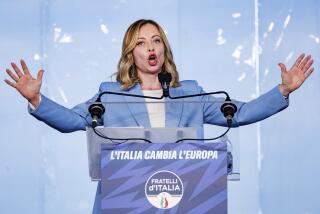Berlusconi Just Loves Berlusconi
- Share via
ROME — One day he likens himself to Napoleon. A few days later, it’s none other than Jesus Christ.
The irrepressible Silvio Berlusconi, surgically enhanced prime minister and Italy’s richest man, is running for reelection. And despite a record of embarrassing public gaffes, disastrous economic performance and unpopular foreign policies, he stands a decent chance of winning.
Berlusconi is leading a center-right coalition of parties into the April 9-10 vote against a center-left alliance headed by Romano Prodi, an ex-prime minister and a former European Commission president. Polls have fairly consistently given Prodi a four-point lead, but experts caution that the race is too close to call, especially given Berlusconi’s ability to dominate the media -- a large portion of which he and his family own.
In a campaign that has largely avoided pressing issues, Berlusconi managed to win what amounted to an endorsement from President Bush and a rare opportunity to speak before the U.S. Congress early this month. Although Bush is unpopular in Italy, Berlusconi has used his friendship with the president to prove his importance on the world stage.
And many Italians buy it. They laugh at him, or roll their eyes, but they also, begrudgingly or not, admire his successes. He has managed to portray his many legal troubles, including calls Friday for yet another indictment, as a plot by communist judges and prosecutors out to get him. Even his embarrassing comments he later blames on leftist journalists out to get him.
“He’s a megalomaniac,” said supporter Giuliano Ferrara, editor of the Il Foglio newspaper, which is partly owned by the Berlusconi empire. “But he’s also a great victimist. He knows how to act like a victim.”
Berlusconi, whose hair seems to grow thicker and darker by the day, has acknowledged having face-lifts. A short man pushing 70, he often wears makeup and heels and sports a George Hamilton tan. He is known for making poor-taste jokes that often insult or embarrass world leaders and for grabbing headlines with comments such as saying he would abstain from sex until the election and promising to sail to Tahiti if he lost. A former cruise ship singer married to an ex-actress, he plans to release a new CD of his songs ahead of the election.
“I am the Jesus Christ of politics,” he told supporters over a dinner late last month.
“I am a patient victim, I put up with everyone, I sacrifice myself for everyone.”
And a few days before that, on a TV talk show: “We have worked a lot. Only Napoleon did more than me -- but I am certainly taller than him.”
More to the point, Berlusconi has weathered the kinds of legal storms that could easily terminate the average political career. The target of numerous corruption investigations, he stood trial while in office on bribery charges involving an old business deal. He is currently fending off allegations that he bribed a British lawyer -- the husband of a British Cabinet minister -- to lie on his behalf in yet another trial. On Friday, prosecutors in Milan said they were seeking an indictment in the case.
Berlusconi and his family own or control most of Italy’s broadcast media and several newspapers, as well as insurance companies, the country’s largest publishing house and a premier soccer team.
The media holdings, especially, represent a conflict of interest that has been widely condemned by European Union monitoring agencies. The concentration of ownership has also restricted media to the point that Reporters Without Borders ranked Italy as the worst country in Western Europe for press freedoms.
In the first two months of this year, Berlusconi appeared on TV and radio programs morning, noon and night. In one three-week period, Berlusconi appeared on television for more than five hours, compared with about 20 minutes for Prodi, according to a public relations firm that monitors broadcasts. Often the prime minister was the sole guest on a chat show on a station he owned, in which a fawning host asked puff questions.
Berlusconi has mastered the Italian goal of maintaining the bella figura -- looking good -- while converting politics into entertainment, complete with the buxom blond showgirls that he famously introduced on his television stations.
“In a post-ideological age, what Mr. Berlusconi is selling is Mr. Berlusconi, not a party or program,” said Alexander Stille, a journalism professor at Columbia University who has written several books on Italy, including the forthcoming “The Sack of Rome” about Berlusconi.
“The bedrock of Mr. Berlusconi’s electorate has little interest in politics, reads little or not at all and watches a lot of television,” Stille said in a column printed in London’s Financial Times and Rome’s La Repubblica. “The more they watch, the more likely they are to vote for Berlusconi.”
Election regulations that require equal time on the airwaves for candidates kicked in when Parliament was dissolved last month and the campaign officially commenced. That came only after Berlusconi had persuaded President Carlo Azeglio Ciampi to delay dissolving the legislature by two weeks.
With those two weeks, Berlusconi gained more unfettered air time. He also won time to pass legislation that his critics say benefited him and his interests. Berlusconi has long been accused of using Parliament, which his coalition dominates, as a personal fiefdom.
In the final weeks, Berlusconi’s allies pushed through laws that weakened prosecutors who have so often challenged the prime minister, shortening the statute of limitations on white-collar crimes and limiting the ability of prosecutors to appeal sentences they judge as too lenient.
In December, his coalition passed a highly complicated change to electoral law, reintroducing proportional representation, which would limit the damage if the bloc fared poorly in the election. It was proposed at a time polls predicted Berlusconi would lose.
Berlusconi, elected in 2001, is the first Italian prime minister to finish a full five-year mandate since World War II, a tumultuous period of revolving-door governments. He rose to political power by stepping into the void left by a blitz of corruption scandals and aggressive prosecutions in the 1990s.
One result today, says Ferrara, is a rather upside-down electoral dynamic. Berlusconi, whom Forbes magazine rates as one of the world’s most powerful billionaires, successfully casts himself as an anti-intellectual populist. Much of the center-left opposition, on the other hand, is seen as elitist and establishment -- and dull. Its ranks contain many of the same old faces, including Prodi, from the remnants of traditional parties, ranging from reformed Communists to conservative Christian Democrats. Berlusconi, on the other hand, created a new party called Forza Italia, or Go Italy, a name reminiscent of a soccer-stadium cheer.
Against popular opinion, Berlusconi sent nearly 3,000 troops to Iraq to assist the U.S.-led military effort. He now promises to bring them home by year’s end. He is also promising an assortment of gifts to voters, including free services and enhanced pensions to senior citizens, who make up a third of the electorate.
How he would pay for these perks is not clear. Italy fell into a recession last year, registering little or no economic growth in the last five years, and has a budget deficit ballooning beyond permitted EU standards.
Berlusconi shrugs off any setbacks. Asked recently if his nation’s troubles might not spell defeat for him, he responded no. All great statesmen, he said, needed more than five years in office. Like Britain’s Margaret Thatcher and Germany’s Helmut Kohl, he said, he deserved 15 years in power to achieve his goals.
More to Read
Sign up for Essential California
The most important California stories and recommendations in your inbox every morning.
You may occasionally receive promotional content from the Los Angeles Times.











